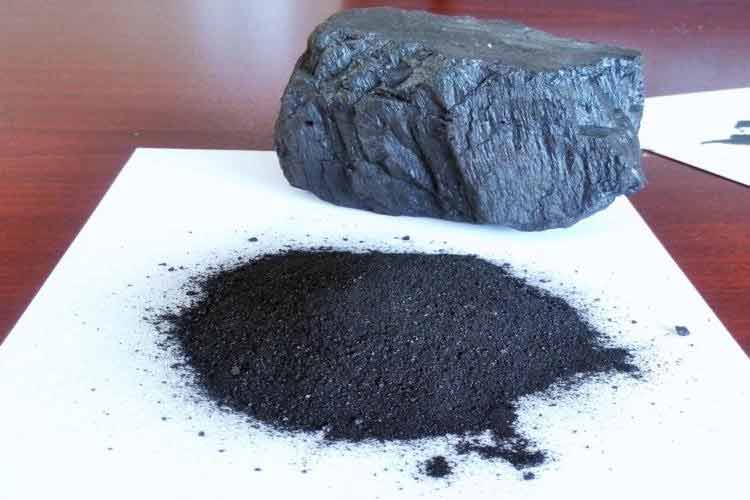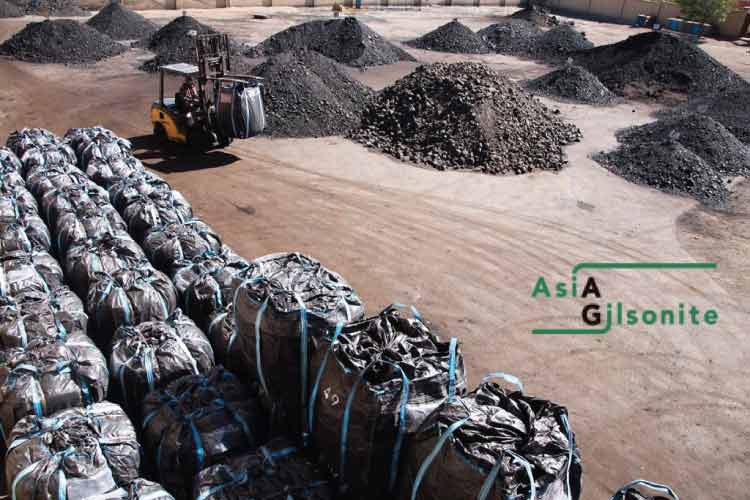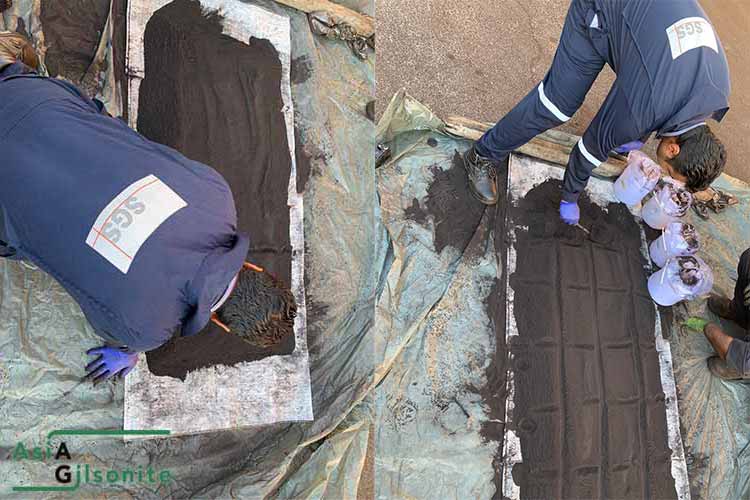Gilsonite powder is the finely ground form of gilsonite and is obtained by milling, pulverizing, or grinding the raw material. This form of gilsonite is a high-quality additive used in the oil and gas drilling industry. It is added to drilling fluids to increase the fluid’s density and prevent fluid loss during drilling. The high carbon content of gilsonite helps to reduce friction and wear on the drilling equipment, thereby prolonging its lifespan. But this is only one example of the many applications of powdered gilsonite. Keep reading the following article to explore more about this material, its uses, ingredients, advantages, and production process.
Gilsonite powder
Gilsonite powder is a naturally occurring mineral substance that is collected from asphalt-rich rock formations. It is a black, lustrous powder that is commonly used in a variety of industrial applications, including in the production of drilling mud, asphalt paving, paint coatings, and as a binding agent in the manufacture of carbon electrodes. Powdered gilsonite is known for its high melting point, excellent waterproofing properties, and resistance to oxidative degradation. It is often used as a substitute for synthetic materials due to its natural origins and environmentally friendly properties.
The Production Process of Gilsonite Powder
Gilsonite powder is produced through a process of mining, crushing, milling, and drying. The process begins with the extraction of gilsonite from underground mines. The raw material is then transported to a crushing facility where it is crushed into small pieces.
The crushed gilsonite is then milled to a fine powder using specialized equipment. The milling process produces a powder with a consistent grain size and uniform texture. The powder is then screened to remove any impurities or oversized particles.
Once the screening process is complete, the powdered gilsonite is dried to remove any excess moisture. The drying process is typically carried out in a rotary dryer or a fluid bed dryer.
After the drying process is complete, the Gilsonite powder is ready for packaging and shipment. The powder is typically packaged in 50-pound bags or in bulk containers for transport to customers around the world.
The Ingredients of Gilsonite Powder
Powdered gilsonite is a natural, high-quality bitumen-like material that is used in various industries. The primary ingredients of this powder include:
Hydrocarbons
The main component found in powdered gilsonite is hydrocarbons, a group of organic compounds made up of hydrogen and carbon molecules.
Resins
Gilsonite powder contains natural resins, which are complex, viscous substances that impart strength and elasticity.
Asphaltenes
Asphaltene is another ingredient found in the powdered gilsonite. Asphaltenes are large, complex molecules, typically found in crude oil and bitumen. They are known for their dark color and high molecular weight.
Mineral Matter
This powder contains a small amount of mineral matter, which is made up of several elements such as calcium, aluminum, and iron. This component gives it its characteristic black color.
Trace Elements
And finally powdered gilsonite also contains trace elements such as sulfur, nitrogen, and oxygen.
Gilsonite Powder Uses
Gilsonite powder has several applications, including:
Drilling Fluids and Mud
Gilsonite is added to drilling fluids and mud to increase viscosity and fluid loss control.
Asphalt and Bitumen Production
Powdered gilsonite is added to asphalt and bitumen to improve its physical and chemical properties, such as elasticity, tensile strength, and water resistance. It is used as a binder and additive to enhance the performance of asphalt. It improves the durability, flexibility, and resistance to weathering and moisture of asphalt pavements. It also reduces the rutting and cracking of asphalt, making it ideal for construction of roads, bridges, and airports. one side we have gilsonite and on the other side we have bitumen but what are the differences between gilsonite and bitumen?
Paints and Coatings
Gilsonite is used as a raw material in the production of rustproof and fireproof coatings and paints. This powder is used as a pigment dispersant and a rheology modifier in paint and coatings. It enhances the gloss, color, and stability of the finished product. It also imparts resistance to water, chemicals, and UV rays
Foundry Sands
Gilsonite powder is used in the production of foundry sands that are used in casting various metals. It works as a mold release agent and a core binder in the foundry industry. It improves the strength and dimensional accuracy of molds and cores. It also reduces the production time and energy consumption.
Adhesives
The so-called powder is used as a raw material in the production of adhesives, hot melt adhesives, pressure-sensitive adhesives, and sealants.
Electrical Insulation
In the production of electrical insulation materials, gilsonite also plays an important role.
Oil and Gas Industry
Gilsonite powder is used as a drilling fluid additive and a cementing agent in the oil and gas industry. It enhances the lubrication and stability of drilling fluids. It also improves the strength and adhesion of cementing slurries.
The Advantages and Disadvantages Over Using Gilsonite Powder
As was mentioned earlier, powdered gilsonite is a natural asphalt-like material that is used in various industries, including construction, drilling, and pavement production. Some potential advantages of using powdered gilsonite in these industries include:
Higher resistance to wear and tear
Powdered gilsonite can be added to asphalt mixtures to increase their durability and resistance to wear and tear. This can result in longer-lasting roads, bridges, and other structures.
Improved binding properties
Gilsonite powder has adhesive properties that can help bind aggregates together in asphalt mixtures, making them stronger and more resilient.
Lower production costs
This powder is often less expensive than other materials used in construction and paving, such as synthetic polymers. This can help reduce production costs for manufacturers.
Environmentally friendly
Gilsonite is a natural, renewable resource that does not release harmful chemicals into the environment when used in construction and paving.
However, it is important to note that there may also be some potential disadvantages to using powdered gilsonite. For example, it may not be suitable for all types of asphalt mixtures or construction applications, and it may be more difficult to work with than other materials. As with any material or product, it is important to carefully consider the specific needs and requirements of your project before deciding whether powdered gilsonite is the right choice.
Conclusion
Gilsonite powder is a versatile material with various industrial applications. Its unique properties make it an excellent additive for drilling fluids, asphalt, and coatings. The finely ground form of gilsonite allows it to be easily incorporated into different formulations, making it a valuable ingredient in many industrial processes.





good